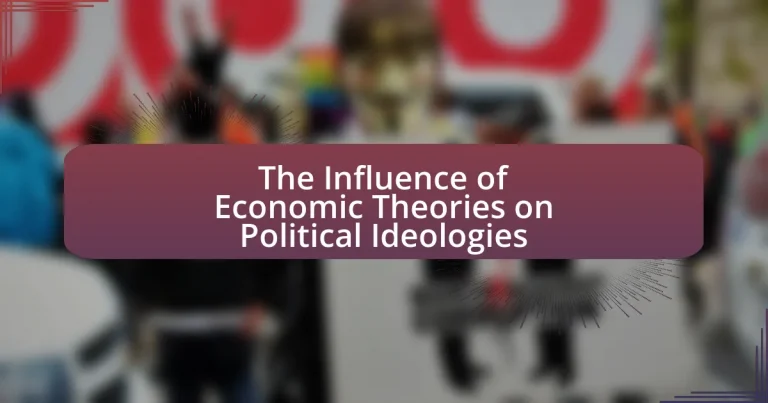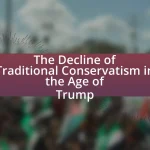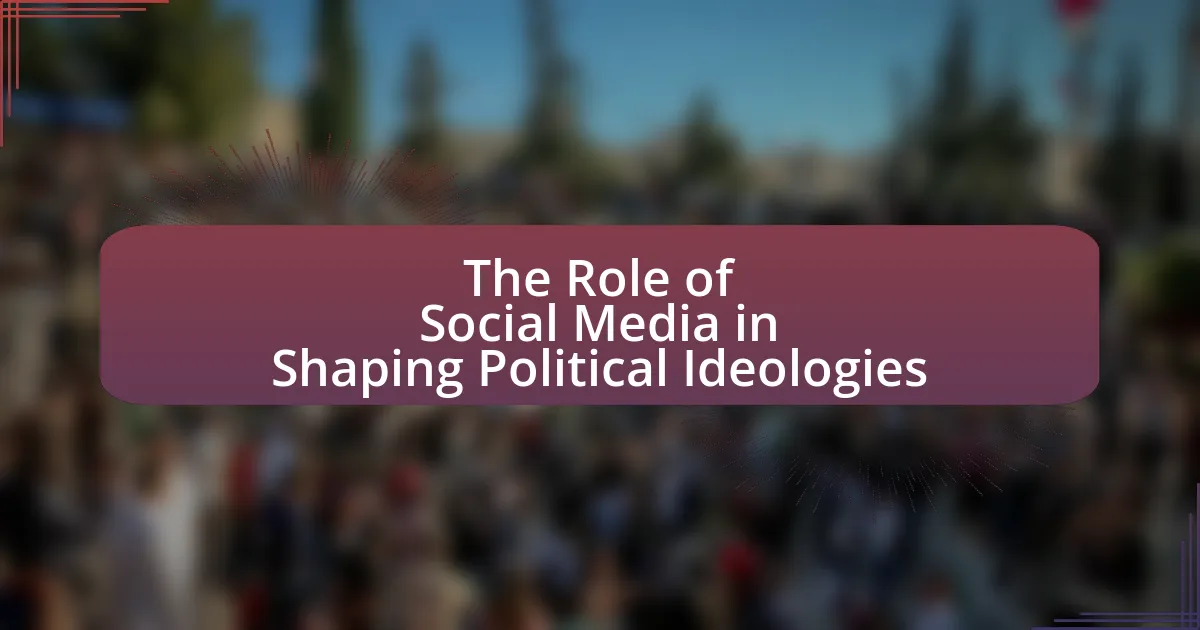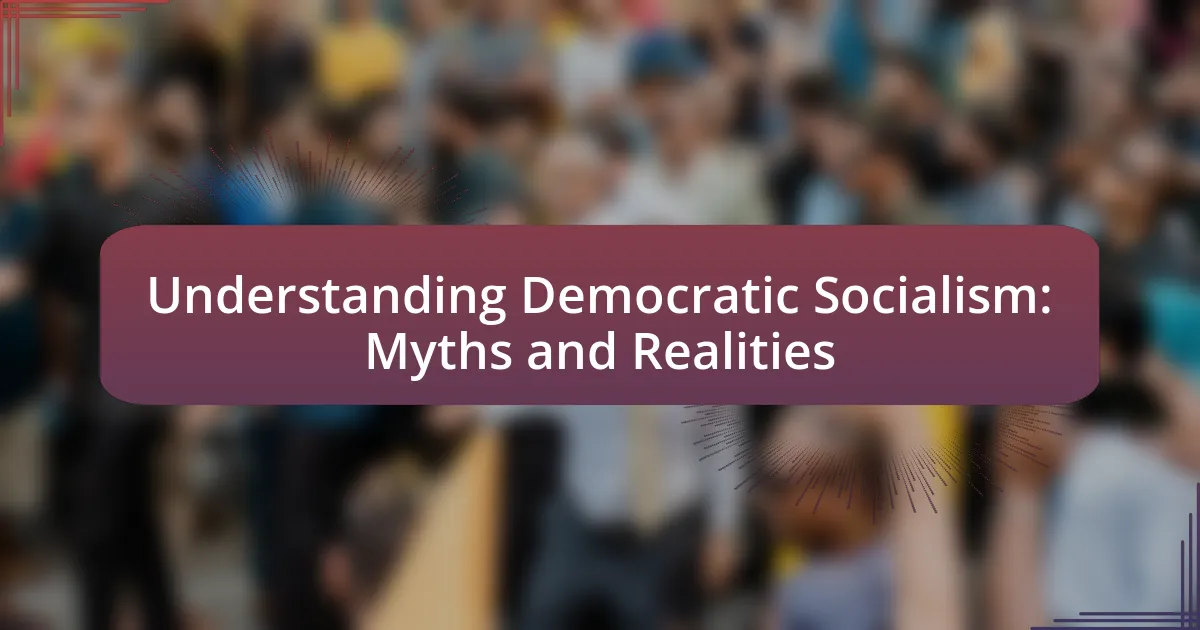The article examines the influence of economic theories on political ideologies, highlighting how frameworks such as classical economics, Keynesian economics, and Marxist economics shape beliefs about wealth distribution, resource allocation, and government roles. It discusses the historical contexts that illustrate this relationship, including the New Deal and the rise of neoliberalism, and analyzes how different political ideologies interpret these economic theories. The article emphasizes the importance of understanding this interplay for informed policy-making and civic engagement, as well as the implications for contemporary issues like income inequality and globalization.

What is the Influence of Economic Theories on Political Ideologies?
Economic theories significantly shape political ideologies by providing frameworks for understanding wealth distribution, resource allocation, and the role of government. For instance, classical economics, which emphasizes free markets and minimal government intervention, underpins liberal ideologies that advocate for individual freedoms and capitalism. In contrast, Keynesian economics, which supports government intervention to stabilize the economy, influences social democratic ideologies that prioritize social welfare and economic equality. Historical examples include the New Deal policies of the 1930s, rooted in Keynesian thought, which reshaped American political ideology towards greater government involvement in the economy. Thus, the interplay between economic theories and political ideologies is evident in how they inform policy decisions and societal values.
How do economic theories shape political ideologies?
Economic theories significantly shape political ideologies by providing frameworks for understanding wealth distribution, resource allocation, and the role of government in the economy. For instance, classical economics, which emphasizes free markets and minimal government intervention, has influenced liberal ideologies that advocate for individual freedoms and capitalism. In contrast, Keynesian economics, which supports government intervention to stabilize the economy, has shaped social democratic ideologies that prioritize social welfare and economic equality. Historical examples include the New Deal policies of the 1930s, rooted in Keynesian thought, which transformed American political ideology towards a more active government role in economic affairs. Thus, the interplay between economic theories and political ideologies is evident in how societies prioritize economic policies and governance structures.
What are the key economic theories that influence political thought?
Key economic theories that influence political thought include classical economics, Keynesian economics, and Marxist economics. Classical economics, founded by Adam Smith, emphasizes free markets and the idea that individual self-interest leads to economic prosperity. Keynesian economics, developed by John Maynard Keynes, argues for government intervention to manage economic cycles and promote full employment, particularly during recessions. Marxist economics, articulated by Karl Marx, critiques capitalism and advocates for a classless society through the redistribution of wealth and resources. These theories shape political ideologies by informing policies on market regulation, social welfare, and economic equality.
How do different political ideologies interpret economic theories?
Different political ideologies interpret economic theories through their foundational beliefs about the role of government, individual agency, and social equity. For instance, capitalism emphasizes free markets and minimal government intervention, viewing economic theories like supply and demand as essential for growth and efficiency. In contrast, socialism advocates for collective ownership and redistribution of resources, interpreting economic theories as tools to address inequality and promote social welfare. Additionally, Keynesian economics, which supports government intervention during economic downturns, is often embraced by social democrats who seek to balance market efficiency with social justice. These interpretations are validated by historical applications, such as the New Deal in the United States, which reflected Keynesian principles to combat the Great Depression, showcasing how political ideologies shape the understanding and application of economic theories.
Why is understanding this influence important?
Understanding the influence of economic theories on political ideologies is important because it shapes policy decisions and societal structures. Economic theories provide frameworks that inform how governments approach issues like taxation, welfare, and regulation, directly impacting citizens’ lives. For instance, the adoption of Keynesian economics during the Great Depression led to significant government intervention in the economy, which reshaped political ideologies towards more progressive policies. This historical context illustrates how economic theories can drive political change and influence governance, making it crucial to comprehend their interplay for informed civic engagement and policy analysis.
What historical contexts highlight the relationship between economic theories and political ideologies?
The historical contexts that highlight the relationship between economic theories and political ideologies include the Industrial Revolution, the Great Depression, and the Cold War. During the Industrial Revolution, the emergence of capitalism as an economic theory led to the rise of liberal political ideologies advocating for free markets and individual rights. The Great Depression prompted a shift towards Keynesian economics, which influenced political ideologies to embrace more interventionist policies, as seen in the New Deal in the United States. The Cold War further illustrated this relationship, as the ideological battle between capitalism and communism was rooted in differing economic theories, with capitalism promoting free enterprise and communism advocating for state control of resources. These contexts demonstrate how economic theories have shaped and been shaped by prevailing political ideologies throughout history.
How does this influence affect policy-making and governance?
Economic theories significantly influence policy-making and governance by shaping the frameworks through which governments assess economic performance and implement regulations. For instance, Keynesian economics advocates for government intervention during economic downturns, leading to policies that promote fiscal stimulus and social welfare programs. This approach has been adopted in various countries, particularly during financial crises, such as the 2008 recession, where governments implemented stimulus packages to revive economies. Conversely, neoliberal economic theories emphasize deregulation and free markets, influencing policies that reduce government spending and promote privatization, as seen in the economic reforms of the 1980s in the United Kingdom and the United States. These theoretical frameworks guide policymakers in their decisions, impacting economic stability, social equity, and overall governance effectiveness.

What are the major economic theories impacting political ideologies?
Major economic theories impacting political ideologies include capitalism, socialism, and Keynesian economics. Capitalism emphasizes private ownership and free markets, influencing ideologies that prioritize individualism and limited government intervention, as seen in liberal and conservative political frameworks. Socialism advocates for collective ownership and redistribution of wealth, shaping ideologies that focus on social equity and government involvement in the economy, prevalent in leftist movements. Keynesian economics, which supports government intervention to stabilize economic cycles, has influenced centrist and progressive ideologies that advocate for mixed economies and social welfare programs. These theories provide foundational principles that guide political beliefs and policy-making across the ideological spectrum.
How does classical economics influence conservative ideologies?
Classical economics significantly influences conservative ideologies by promoting free markets, limited government intervention, and individual responsibility. These principles align with conservative beliefs that prioritize personal freedom and economic efficiency. Classical economists like Adam Smith argued for the “invisible hand” of the market, suggesting that self-interest leads to societal benefits, which conservatives adopt to advocate for minimal regulation and lower taxes. Historical evidence shows that policies inspired by classical economics, such as deregulation and privatization, have been implemented in conservative administrations, reinforcing the belief that economic growth is best achieved through market mechanisms rather than government control.
What principles of classical economics are embraced by conservatives?
Conservatives embrace several principles of classical economics, primarily the belief in free markets, limited government intervention, and the importance of individual entrepreneurship. Free markets are viewed as the most efficient means of allocating resources, as articulated by Adam Smith in “The Wealth of Nations,” where he argued that individuals pursuing their self-interest inadvertently benefit society. Limited government intervention is supported by the idea that excessive regulation stifles economic growth and innovation, a perspective reinforced by historical examples such as the economic expansion during the Industrial Revolution, which thrived under relatively minimal government interference. Additionally, conservatives value individual entrepreneurship, believing that personal initiative drives economic progress and job creation, a principle that aligns with the classical economic view that wealth is generated through productive labor and capital investment.
How do conservative policies reflect classical economic thought?
Conservative policies reflect classical economic thought by emphasizing free markets, limited government intervention, and individual entrepreneurship. Classical economic theory, as articulated by economists like Adam Smith, advocates for the “invisible hand” of the market to allocate resources efficiently, which aligns with conservative beliefs that minimal government interference fosters economic growth. Additionally, conservative policies often prioritize fiscal responsibility and balanced budgets, mirroring classical economics’ focus on sound money and the dangers of inflation. Historical examples include the Reagan administration’s tax cuts and deregulation efforts in the 1980s, which aimed to stimulate economic activity through market-driven principles, demonstrating a direct application of classical economic thought in conservative governance.
In what ways does Keynesian economics shape liberal ideologies?
Keynesian economics shapes liberal ideologies primarily by advocating for government intervention in the economy to promote social welfare and economic stability. This economic theory, developed by John Maynard Keynes during the Great Depression, emphasizes the role of fiscal policy in managing demand, which aligns with liberal beliefs in using state mechanisms to address inequality and unemployment.
For instance, Keynesian principles support progressive taxation and public spending on social programs, which are central to liberal agendas aimed at reducing poverty and enhancing public services. Historical evidence shows that during the post-World War II era, many liberal governments adopted Keynesian policies, leading to significant economic growth and the establishment of welfare states in countries like the United Kingdom and the United States. This historical context illustrates how Keynesian economics has been instrumental in shaping the policy frameworks of liberal ideologies, reinforcing the belief that government action can effectively manage economic cycles and promote social equity.
What are the core tenets of Keynesian economics relevant to liberal thought?
The core tenets of Keynesian economics relevant to liberal thought include the belief in active government intervention to stabilize the economy, the importance of aggregate demand in driving economic growth, and the advocacy for fiscal policies to manage economic cycles. Keynesian economics posits that during periods of economic downturn, increased government spending can stimulate demand and reduce unemployment, which aligns with liberal values of social welfare and economic equity. Historical evidence from the Great Depression demonstrates that Keynesian policies, such as the New Deal in the United States, effectively mitigated economic crises by promoting job creation and infrastructure development, reinforcing the relevance of these tenets to liberal thought.
How do liberal policies incorporate Keynesian principles?
Liberal policies incorporate Keynesian principles by advocating for government intervention in the economy to promote full employment and stabilize economic fluctuations. This approach aligns with Keynesian economics, which emphasizes the role of aggregate demand in influencing economic activity. For instance, during economic downturns, liberal policies often support increased public spending and investment to stimulate demand, reflecting Keynes’ assertion that government action can mitigate recessions. Historical examples include the New Deal programs in the 1930s, which aimed to reduce unemployment through federal investment, demonstrating the practical application of Keynesian principles within liberal frameworks.
What role does Marxist economics play in socialist ideologies?
Marxist economics serves as a foundational framework for socialist ideologies by emphasizing the critique of capitalism and advocating for the collective ownership of the means of production. This economic theory posits that capitalism inherently leads to class struggle, exploitation, and inequality, which socialist ideologies seek to address through the redistribution of wealth and resources. Historical evidence, such as the establishment of socialist states in the 20th century, illustrates the application of Marxist principles, where governments implemented policies aimed at reducing class disparities and promoting social welfare. These policies often included nationalization of industries and the provision of universal healthcare and education, reflecting the core tenets of Marxist economics in practice.
What are the fundamental aspects of Marxist economics that influence socialism?
The fundamental aspects of Marxist economics that influence socialism include the critique of capitalism, the labor theory of value, and the concept of class struggle. Marx’s critique of capitalism highlights the inherent inequalities and exploitation within capitalist systems, arguing that the bourgeoisie profits from the labor of the proletariat. The labor theory of value posits that the value of a commodity is determined by the socially necessary labor time required for its production, which underpins the socialist call for equitable distribution of resources. Additionally, the concept of class struggle emphasizes the conflict between different social classes, driving the need for a revolutionary change towards a socialist society. These aspects collectively inform socialist ideologies by advocating for collective ownership and the redistribution of wealth to achieve social equity.
How do socialist movements utilize Marxist economic theories?
Socialist movements utilize Marxist economic theories primarily to critique capitalism and advocate for the redistribution of wealth and resources. By applying Marx’s analysis of class struggle, these movements emphasize the exploitation of the working class by the bourgeoisie, arguing that capitalism inherently leads to inequality and social injustice. Historical examples include the Bolshevik Revolution in 1917, where Marxist principles guided the establishment of a socialist state aimed at abolishing private property and implementing collective ownership of production. Additionally, contemporary socialist movements often reference Marx’s labor theory of value to support policies that prioritize workers’ rights and equitable economic systems, reinforcing their stance against capitalist exploitation.

How do economic theories interact with political ideologies in practice?
Economic theories interact with political ideologies in practice by shaping policy decisions and influencing governance structures. For instance, Keynesian economics, which advocates for government intervention to stabilize the economy, has historically aligned with social democratic ideologies, leading to policies that promote welfare and public spending. Conversely, neoliberal economic theories, emphasizing free markets and minimal government intervention, have influenced conservative political ideologies, resulting in deregulation and privatization initiatives. The interaction is evident in historical contexts, such as the New Deal in the United States during the Great Depression, where Keynesian principles were adopted by a politically progressive administration to address economic crises. This demonstrates how economic theories can provide the framework for political ideologies to formulate actionable policies that reflect their core values.
What examples illustrate the influence of economic theories on political decisions?
Economic theories significantly influence political decisions, as evidenced by the adoption of neoliberal policies in the late 20th century. For instance, the implementation of Ronald Reagan’s economic policies in the United States during the 1980s, which were rooted in supply-side economics, aimed to stimulate economic growth through tax cuts and deregulation. This approach was based on the belief that reducing taxes would increase investment and, consequently, job creation. Similarly, the economic reforms in the United Kingdom under Margaret Thatcher, which emphasized privatization and reduced government intervention, were influenced by monetarist theories that prioritized controlling inflation over unemployment. These examples demonstrate how economic theories shape political strategies and policy-making, leading to significant shifts in governance and economic management.
How have specific policies been shaped by economic theories in various countries?
Specific policies in various countries have been shaped by economic theories through the adoption of frameworks such as Keynesianism, neoliberalism, and socialism. For instance, Keynesian economic theory influenced the United States during the Great Depression, leading to the implementation of the New Deal, which focused on government intervention to stimulate economic growth. In contrast, neoliberalism, which emphasizes free markets and deregulation, shaped policies in the United Kingdom under Margaret Thatcher, resulting in privatization of state-owned enterprises and reduction of government spending. Additionally, socialist economic theories have guided policies in countries like Cuba, where the government controls major industries and resources to promote equality and social welfare. These examples illustrate how economic theories directly inform and shape national policies, reflecting the ideological underpinnings of each country’s approach to governance and economic management.
What case studies demonstrate the impact of economic theories on political ideologies?
Case studies that demonstrate the impact of economic theories on political ideologies include the rise of neoliberalism in the late 20th century and the implementation of Keynesian economics during the Great Depression. Neoliberalism, which emphasizes free markets and deregulation, significantly influenced political policies in countries like the United States and the United Kingdom during the 1980s, leading to a shift towards conservative governance under leaders such as Ronald Reagan and Margaret Thatcher. This shift was supported by economic theories advocating for reduced government intervention in the economy, which were articulated by economists like Milton Friedman.
Similarly, Keynesian economics, which advocates for government intervention to manage economic cycles, shaped political ideologies during the Great Depression. The New Deal policies implemented by President Franklin D. Roosevelt in the 1930s were grounded in Keynesian principles, aiming to stimulate economic recovery through public spending and social welfare programs. This approach fundamentally altered the role of government in the economy and established a precedent for future economic policies in the United States.
These case studies illustrate how economic theories can directly influence political ideologies and governance strategies, shaping the policies and political landscapes of nations.
How do contemporary issues reflect the influence of economic theories on political ideologies?
Contemporary issues reflect the influence of economic theories on political ideologies through the application of concepts such as capitalism, socialism, and Keynesian economics in policy-making. For instance, the rise of populism in various countries can be traced back to economic theories that emphasize wealth distribution and the critique of neoliberal policies, which have led to increased inequality. The 2008 financial crisis prompted a resurgence of Keynesian ideas advocating for government intervention in the economy, influencing political platforms that prioritize social welfare and economic regulation. Additionally, debates on climate change have seen the integration of ecological economics into political ideologies, pushing for sustainable development policies that challenge traditional capitalist frameworks. These examples illustrate how economic theories shape political discourse and policy responses to contemporary challenges.
What current economic challenges are reshaping political ideologies?
Current economic challenges reshaping political ideologies include income inequality, inflation, and the impact of globalization. Income inequality has led to a rise in populist movements, as individuals feel marginalized by the economic system; for instance, the Gini coefficient, which measures income distribution, has shown increasing disparity in many countries. Inflation, particularly post-pandemic, has prompted debates on monetary policy and government intervention, influencing ideologies toward more state involvement in the economy. Additionally, globalization has sparked discussions on protectionism versus free trade, with political ideologies adapting to address the concerns of those affected by job losses in traditional industries. These economic challenges are driving a reevaluation of existing political frameworks and the emergence of new ideologies that prioritize economic justice and sustainability.
How do political parties adapt their ideologies in response to economic theories?
Political parties adapt their ideologies in response to economic theories by modifying their policy positions to align with prevailing economic thought and public sentiment. For instance, during economic downturns, parties may shift towards Keynesian principles, advocating for increased government spending to stimulate growth, as seen in the response to the 2008 financial crisis when many parties globally embraced stimulus packages. Conversely, in periods of economic stability or growth, parties might adopt neoliberal policies, emphasizing deregulation and free markets, reflecting the influence of classical economic theories. This adaptability is evident in the Democratic Party’s shift towards more progressive economic policies in response to growing inequality, influenced by Piketty’s research on wealth distribution. Such adjustments demonstrate how political parties continuously reassess their ideologies to resonate with economic realities and voter expectations.
What practical insights can be drawn from the influence of economic theories on political ideologies?
Economic theories significantly shape political ideologies by providing frameworks for understanding wealth distribution, resource allocation, and governance. For instance, classical economics, which emphasizes free markets and minimal government intervention, has influenced liberal ideologies advocating for individual freedoms and capitalism. In contrast, Keynesian economics, which supports government intervention to stabilize economies, has shaped social democratic ideologies that prioritize social welfare and economic equality. Historical examples include the New Deal policies of the 1930s, which were rooted in Keynesian principles and transformed the Democratic Party’s platform towards greater government involvement in the economy. These insights illustrate how economic theories not only inform political strategies but also reflect societal values regarding equity and governance.
How can understanding this influence improve political discourse?
Understanding the influence of economic theories on political ideologies can improve political discourse by fostering informed discussions that bridge ideological divides. When individuals recognize how economic principles shape policy decisions and political beliefs, they can engage in more constructive debates, focusing on evidence-based arguments rather than emotional rhetoric. For instance, acknowledging the impact of Keynesian economics on social welfare policies allows participants to discuss the merits and drawbacks of such policies with a shared understanding of their theoretical foundations. This approach can lead to more nuanced conversations, reducing polarization and promoting collaborative problem-solving in political contexts.
What strategies can policymakers use to align economic theories with political ideologies effectively?
Policymakers can effectively align economic theories with political ideologies by adopting integrative frameworks that incorporate both empirical evidence and ideological principles. For instance, utilizing mixed-method approaches allows policymakers to blend quantitative data from economic models with qualitative insights from political theory, ensuring that policies resonate with the values of the political ideology in question. Historical examples, such as the New Deal in the United States, illustrate how policymakers successfully integrated Keynesian economic theories with progressive political ideologies to address economic crises, thereby reinforcing the legitimacy of both the economic approach and the political agenda. This alignment fosters public support and enhances the effectiveness of policy implementation.





